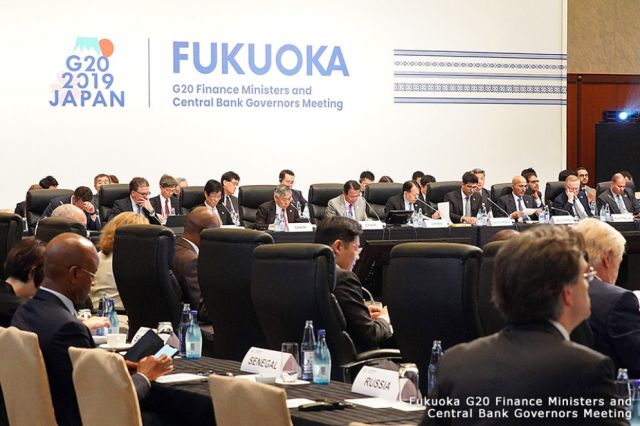
G20 finance ministers and central bank governors meeting. The 2019 G20 Osaka summit will be held June 28-29 in Japan. (Source: G20.org)
Oil prices edged lower on June 27, pressured by worries about whether the G20 summit will produce a breakthrough on trade that could strengthen the global economy and boost oil demand.
Brent crude futures fell 18 cents, or 0.3%, to $66.31 a barrel by 10:30 a.m. CDT (15:30 GMT). U.S. West Texas Intermediate (WTI) crude futures fell 13 cents, or 0.2%, to $59.25 a barrel.
U.S. President Donald Trump said June 26 a trade deal with Chinese President Xi Jinping was possible this weekend but he is prepared to impose U.S. tariffs on most remaining Chinese imports if the two countries don't agree.
"It's all about the G20," said Craig Erlam, analyst at OANDA. "It's clear that investors are a little cautious when it comes to this meeting, given how talks collapsed previously and the fighting talk we've since seen from both sides."
__________________________________________________________________________________________________
RELATED:
Frac Spread: Markets Try To Navigate Geopolitical Straits
Petroleum Détente: OPEC Makes Peace With Shale
__________________________________________________________________________________________________
On June 26, oil jumped more than 2% after the latest U.S. petroleum supply report showed a larger-than-expected drop in crude stocks. Inventories fell 12.8 million barrels, exceeding the 2.5 million barrel drop analysts had expected.
"Despite these stunning numbers there are still many doom-and-gloom people that are down on the economy. That is why the oil market will take its cue from G20 headlines," Phil Flynn, an analyst at Price Futures Group in Chicago, said in a note.
Traders said follow-through buying was being crimped by uncertainty over whether there will be a trade breakthrough at the G20 that can boost oil demand, and by questions about continued output cuts by OPEC and its allies.
After the G20 summit ends on June 29, OPEC and allies including Russia meet July 1-2 to discuss an extension of production cuts to support prices.
Iraq's oil minister said in London OPEC was expected to roll over the deal and discuss deepening the curbs. Iraq is the second country after Algeria to mention the idea of a bigger reduction.
"It has been effective to a certain level to minimize the glut in the market, but there are now ideas or calls for agreeing even more," Oil Minister Thamer Ghadhban said.
Elsewhere, the government of Canada's main crude-producing province, Alberta, eased crude oil production curtailments for August on June 27, setting the limit at 3.74 million barrels per day (bbl/d), compared with 3.71 million bbl/d in July.
Recommended Reading
US Leads Global Oil Production for Sixth Straight Year-EIA
2024-03-11 - The Energy Information Administration says it is unlikely that the record will be broken by another country in the near term.
Oil Broadly Steady After Surprise US Crude Stock Drop
2024-03-21 - Stockpiles unexpectedly declined by 2 MMbbl to 445 MMbbl in the week ended March 15, as exports rose and refiners continued to increase activity.
The Secret to Record US Oil Output? Drilling Efficiencies—EIA
2024-03-06 - Advances in horizontal drilling and fracking technologies are yielding more efficient oil wells in the U.S. even as the rig count plummets, the Energy Information Administration reported.
Global Oil Demand to Grow by 1.9 MMbbl/d in 2024, Says Wood Mac
2024-02-29 - Oil prices have found support this year from rising geopolitical tensions including attacks by the Iran-aligned Houthi group on Red Sea shipping.
WoodMac: Market Likely to Absorb Aramco’s Downshift in Oil Production
2024-02-02 - Saudi Aramco’s move from a targeted 13 MMbbl/d capacity by 2027 is not expected to tighten the supply and demand balance this decade, Wood Mackenzie analysts said.


